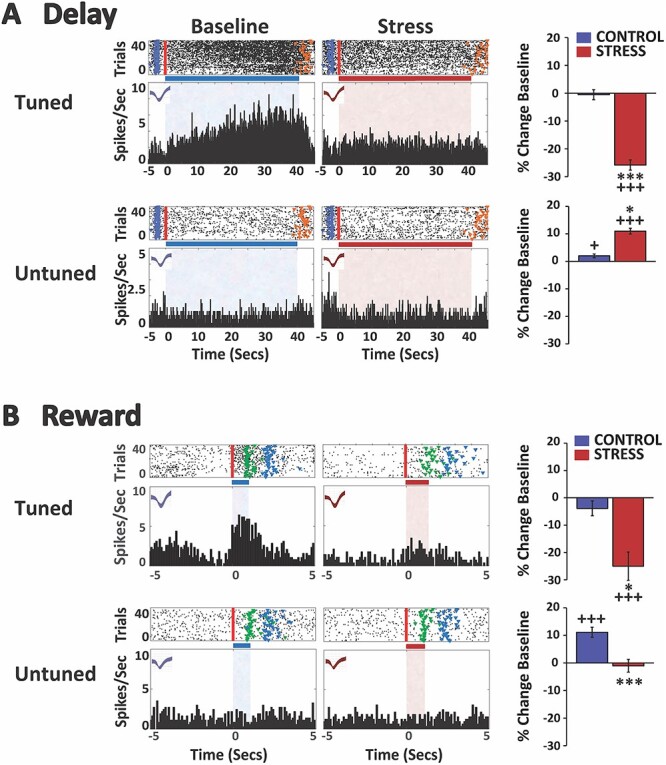Fig. 2.

Stress suppresses spiking activity of delay- and reward-tuned WS/pyramidal-dmPFC neurons. A) Stress suppresses delay-related activity of strongly tuned dmPFC neurons. Top row: spike rasters and PETHs of a single exemplar neuron strongly tuned (tuned) to the delay interval under both baseline and stress conditions (no-stress control rasters/PETHs not shown). In raster displays, vertical red line indicates start of the delay interval and colored fiducial markers indicate beginning of additional events: blue, pickup; orange, gate lift (end of delay). Horizontal bar and shading (blue, baseline; red, stress) indicate delay interval. X-axes = time (s), Y-axes = spiking frequency. Bar graphs depict mean change (±SEM) from baseline firing rate of all neurons classified as strongly tuned to the delay interval. For neurons strongly tuned to delay, stress significantly suppressed delay-related firing relative to baseline and no-stress controls. Bottom row: spike rasters and PETHs of a single neuron not tuned (untuned) to delay under baseline and stress conditions. Stress significantly increased delay-related firing for untuned neurons relative to baseline and no-stress controls (bar graphs). B) Stress suppresses reward-related activity of strongly tuned dmPFC neurons. Top row: spike rasters and PETHs of a single neuron strongly tuned to the reward interval under baseline and stress conditions (only correct trials on which reward was received are plotted/analyzed). In raster displays, vertical red line indicates start of the reward proximity interval and colored fiducial markers indicate beginning of additional events: green, sugar reward receipt; blue, pickup. Bar graphs indicate stress significantly suppressed reward-related firing in this population of neurons relative to baseline and no-stress controls. Bottom row: spike rasters and PETHs of a single neuron not tuned to reward under baseline and stress conditions. In no-stress controls, there was a modest increase in reward-related firing of untuned neurons during the second testing session. Stress significantly suppressed reward-related activity relative to no-stress controls. *P < 0.05, ***P < 0.001 vs. no-stress control. +P < 0.05, +++ < 0.001 vs. baseline.
